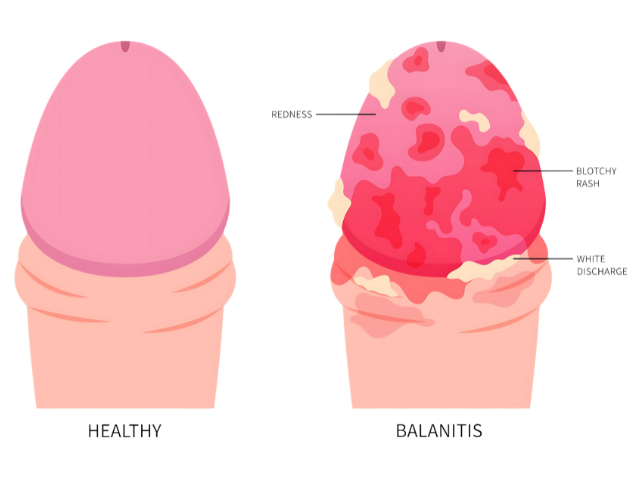Balanoposthitis is a painful urological condition that affects uncircumcised or partially circumcised men. Many men hesitate to seek medical attention for this intimate issue, but if left untreated, it can lead to severe complications. Here’s everything you need to know about balanoposthitis and its treatment options at KK Virat Hospital, Karimnagar.
What Is Balanoposthitis?
Balanoposthitis is the inflammation of the foreskin and glans in uncircumcised men. While mild cases may resolve on their own, persistent or severe cases require medical intervention. The condition is common and usually treatable with proper diagnosis and care.

Causes of Balanoposthitis
Balanoposthitis can be triggered by various factors. Identifying the underlying cause is crucial for effective treatment. The most common causes include:
- Sexually Transmitted Infections (STIs) – Certain STIs can contribute to balanoposthitis.
- Infections – Yeast infections, chlamydia, bacterial infections, and fungal infections.
- Poor Hygiene – Inadequate cleaning can lead to bacterial buildup.
- Skin Conditions – Eczema, psoriasis, and balanitis xerotica obliterans (BXO).
- Irritants – Allergic reactions to soaps, perfumes, or latex.
- Trauma or Injuries – Friction or rough handling of the foreskin.
- Diabetes – High blood sugar levels promote bacterial and fungal growth.
Symptoms of Balanoposthitis
Common symptoms of balanoposthitis include:
- Difficulty retracting the foreskin
- Pain and tenderness
- Redness and swelling of the foreskin
- Itching or burning sensation
- Dry or shiny skin on the glans
- Thick, leathery skin (lichenification)
- Foul-smelling discharge
When to See a Doctor?
Seek immediate medical attention if you experience:
- Persistent pain or tenderness in the foreskin.
- Thickening or dryness of the foreskin.
- Continuous burning, itching, or discomfort.
- Abnormal discharge with a foul smell.
Early diagnosis and treatment prevent complications and ensure a faster recovery.
Complications of Untreated Balanoposthitis
If left untreated, balanoposthitis can lead to:
- Balanitis Xerotica Obliterans (BXO) – Hardening of the glans and foreskin, leading to severe discomfort.
- Phimosis – Tightening of the foreskin, making retraction difficult.
- Paraphimosis – Inability to return the retracted foreskin to its original position.
- Meatal Stenosis – Narrowing of the urethra, causing urinary difficulties.
Diagnosis of Balanoposthitis
At KK Virat Hospital, Karimnagar, our expert urologists diagnose balanoposthitis through:
- Biopsy (if necessary) – To check for chronic conditions like BXO.
- Physical Examination – A thorough check-up of the penis and foreskin.
- Swab Test – To detect infections like yeast or bacterial infections.
- Blood Tests – To rule out diabetes or other underlying conditions.
Treatment Options for Balanoposthitis
Non-Surgical Treatment
For mild to moderate cases, non-surgical treatments are usually effective:
- Antibiotics – Prescribed if bacterial infections or STIs are the cause.
- Antifungal Medications – Effective for yeast infections.
- Steroid Creams – To reduce inflammation and itching.
- Diabetes Management – Essential for diabetic patients to prevent recurrent infections.
- Improved Hygiene Practices – Proper cleaning techniques to prevent recurrence.
Surgical Treatment (Circumcision)
For chronic or recurrent cases, circumcision is the best solution. At KK Virat Hospital, Karimnagar, we offer:
- Laser Circumcision – A minimally invasive procedure using a laser for precision and quick recovery.
- Stapler Circumcision – Uses a surgical stapler for a painless and scar-free experience.
- Open Circumcision – A traditional method for complete foreskin removal.
These procedures ensure permanent relief from balanoposthitis and prevent future complications.
What is Recurrent Balanoposthitis?
Recurrent balanoposthitis refers to repeated episodes of foreskin inflammation. It can result from poor hygiene, infections, underlying health conditions, or irritants. Preventive measures include:
- Regular medical check-ups to detect early signs.
- Maintaining good personal hygiene.
- Managing chronic conditions like diabetes.
- Avoiding known irritants and allergens.
Post-Surgical Care After Circumcision
After circumcision, follow these guidelines for a smooth recovery:
- Follow up with your doctor for post-surgery assessment.
- Keep the surgical area clean and dry.
- Avoid heavy activities for a few weeks.
- Wear loose-fitting clothes to minimize discomfort.
- Take prescribed medications as directed.
Insurance Coverage for Balanoposthitis Treatment
Most insurance providers cover circumcision if it is medically necessary. At KK Virat Hospital, Karimnagar, we provide complete insurance assistance. Our team will help you with the paperwork and claim process.
Why Choose KK Virat Hospital for Balanoposthitis Treatment?
- Experienced Urologists – Our team consists of top urologists specializing in foreskin-related conditions.
- Advanced Surgical Techniques – We use the latest methods like laser and stapler circumcision for safe and effective treatment.
- Personalized Treatment Plans – We offer tailored treatment based on individual patient needs.
- Affordable & Insurance-Covered Treatments – We ensure cost-effective solutions with insurance assistance.
Book Your Appointment Today
If you are experiencing symptoms of balanoposthitis, don’t delay seeking medical help. Contact KK Virat Hospital, Karimnagar, today to book an appointment with our expert urologists for safe and effective treatment.
- Call Us Directly: Get in touch with our medical coordinators to schedule an appointment with an expert urologist.
- Direct Visit: You can visit our hospital directly by carrying your previous medical records if you have a medical history. However, admission will be based on the doctor’s recommendation.
Can Balanoposthitis go away on its own?
In mild cases, Balanoposthitis may resolve on its own with proper hygiene and care. However, if symptoms persist or worsen, medical treatment is necessary to prevent complications.
Is Balanoposthitis contagious?
Balanoposthitis itself is not contagious, but if caused by an infection such as a fungal or bacterial infection, it may spread through sexual contact or poor hygiene.
Does Balanoposthitis always require surgery?
No, Balanoposthitis can often be treated with medications such as antifungal creams, antibiotics, and proper hygiene. Surgery, such as circumcision, is only recommended for recurrent or severe cases.
What’s the recovery period after Balanoposthitis treatment?
Recovery depends on the severity and treatment method. With medication, symptoms typically improve within a week. If surgery is required, full recovery may take 2-4 weeks.
Can Balanoposthitis affect my sex life?
Yes, Balanoposthitis can cause discomfort, pain, and inflammation, which may interfere with sexual activity. Proper treatment helps restore normal function and prevents long-term complications.
Is Balanoposthitis painful?
Yes, Balanoposthitis can cause pain, tenderness, itching, and irritation in the foreskin and glans. If left untreated, symptoms may worsen.
What causes Balanoposthitis?
Balanoposthitis can be caused by infections (bacterial or fungal), poor hygiene, skin conditions like eczema or psoriasis, allergic reactions, or chronic conditions like diabetes.
How can I prevent Balanoposthitis?
Maintain good hygiene, avoid harsh soaps or irritants, practice safe sex, and manage underlying conditions like diabetes to reduce the risk of developing Balanoposthitis.
When should I see a doctor for Balanoposthitis?
Consult a doctor if symptoms persist for more than a few days, worsen, or if you experience severe pain, discharge, or difficulty retracting the foreskin.
Can Balanoposthitis lead to complications?
If left untreated, Balanoposthitis can cause chronic infections, phimosis (tight foreskin), scarring, painful urination, and an increased risk of urinary tract infections (UTIs).


